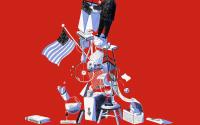24 January 2006Znet
On January 23, 2006, Canada's Conservative Party won national power. 2006 is an important year for elections in the Americas. Two have already occurred. In Bolivia, Evo Morales became the first indigenous President in a country that is majority indigenous. In Chile, Michelle Bachelet's socialists won. In the coming months, there will be elections in Peru, Colombia, Venezuela, Mexico, Guyana, Ecuador, Costa Rica, Nicaragua, and maybe even Haiti. In many of these elections, like in Bolivia and Chile, left parties will win.
The gains for the left are fueled by popular rejection of 'free trade', as Mark Weisbrot notes (http://www.zmag.org/content/showarticle.cfm?SectionID=52&ItemID=9562), and by popular rejection of the US's aggressive military posture in the world. The right-wing and elite in most countries identify with US interests. Leftists, who claim (and sometimes do) represent the victims of US foreign and economic policies, are gaining as US military aggression and neoliberal economics are repudiated.
If the Americas are moving left, why did Canada move in the wrong direction? There are several reasons, some of which are structural.
The first reason Canadians voted for a party closely identified with the US, even as Latin Americans are rejecting such parties, is that Canadians do not have the same firsthand experience of harsh US policies. In most US foreign policy ventures in the Americas and elsewhere, Canada is not a victim but a junior partner. The 2004 Haiti coup is only the most dramatic example. Second, the Canadian media have the same political economy – corporate ownership, advertiser funding, identification with the powerful – as exist elsewhere, and they restrict the public discourse. In many Latin American countries, popular organizations are able to compensate for media concentration and maintain communication with their constituencies. In Canada, however, like the US, such organizations are much weaker and society depends more heavily on the media. A third factor, though it applies equally to Latin American countries, is that the liberal and conservative parties have more resources than left parties. Recent legislation in Canada has made it more difficult for political parties to raise funds from corporations, but this, while positive, will not level the playing field.
Having identified some reasons for the move to the right, it should be noted that the electoral outcome does not suggest a popular shift to the right at all. The main left party, the social democratic NDP, made significant gains – up to 29 seats from 18 previously – and won 17% of the popular vote. The Bloc Quebecois, whose platform is also social democratic, won 10% of the popular vote campaigning only in the province of Quebec, and 51 seats. And the conservatives won a minority, not a majority. The vote is not a mandate for Canadian conservatism. It was a rebuke to the Liberals, who had been in power for 12 years and had engaged in corruption scandals. Were it not for what the Conservatives are likely to do with it, it could be seen as an elegant way of punishing the liberals without rewarding the Conservatives too much – the best Canadian voters could have managed in the existing system.
It is unlikely to work out that way, however. When Bush won in the contested 2000 election in the US, optimistic progressives suggested he would not have a mandate. Bush did not let a little thing like lacking a mandate stop him from moving on domestic economic policy or several invasions. Canada's new Prime Minister, Stephen Harper, advised by US strategists and think tanks, with members of his parliament affiliated with US right-wing organizations, is likely to follow his mentor in this.
The right has a coordinated strategy for power. It has a grassroots movement, a group of intellectuals to find the right issues and develop the right language to talk about them, public relations firms to work the media, independent media of its own to pressure from the outside, and the resources to make it all happen. Their strategy brought them to power in the US, in Australia (http://www.zmag.org/content/showarticle.cfm?SectionID=102&ItemID=9560), and now in Canada. In their rise to power in these countries, the right has been helped by ineffective, corrupt, and unprincipled liberals. Indeed, in Canada today, it would probably be more accurate to talk of a Conservative-Liberal coalition government than a Conservative minority government, since the Conservatives and Liberals agree on so much.
The same activities, usually accompanied by violence, have been used by the right, and by the US, in Latin America. There, they go by the name of 'democracy promotion'. In Latin America 'democracy promotion' often fails because it is opposed by large popular organizations and leftist movements with strategies of their own. If Canadians and Americans could catch up, we might have a chance.






